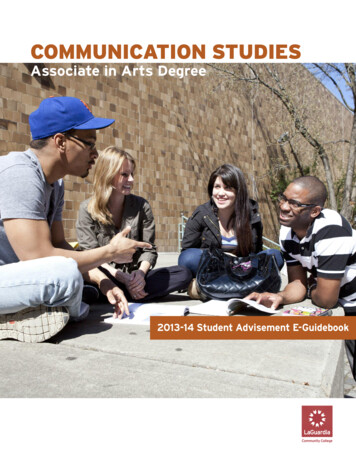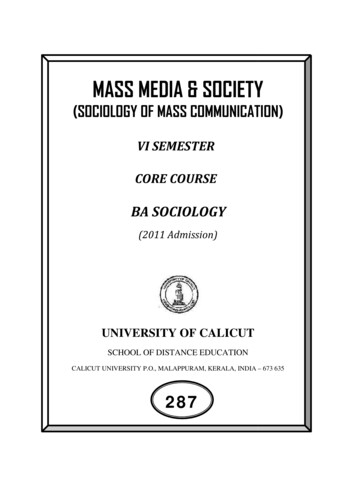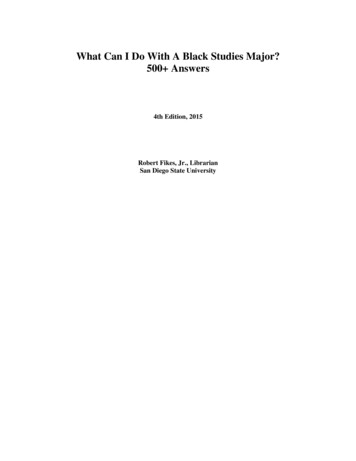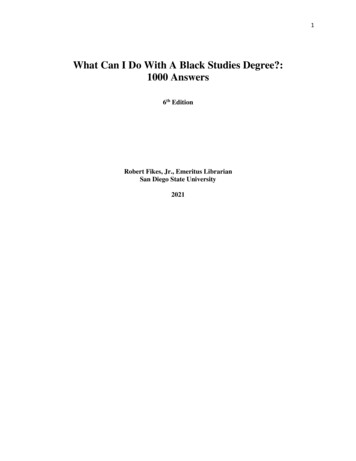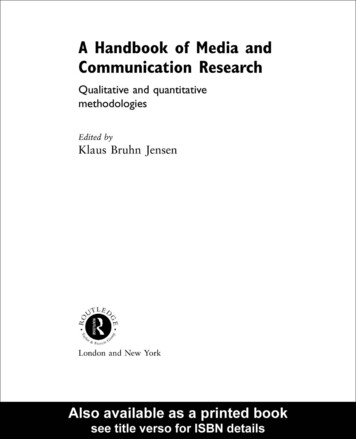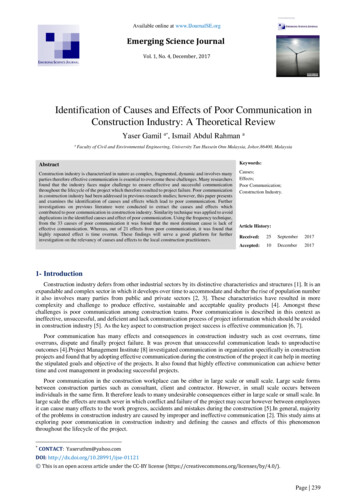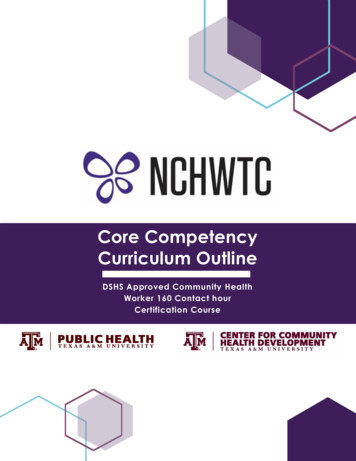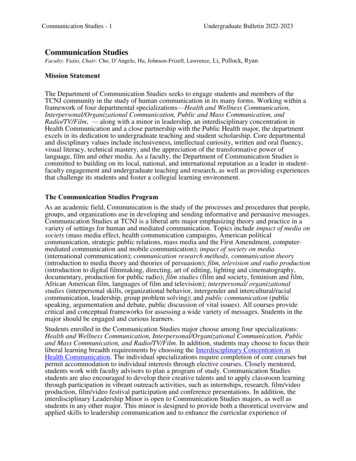
Transcription
Communication Studies - 1Undergraduate Bulletin 2022-2023Communication StudiesFaculty: Fazio, Chair; Cho, D’Angelo, Hu, Johnson-Frizell, Lawrence, Li, Pollock, Ryan.Mission StatementThe Department of Communication Studies seeks to engage students and members of theTCNJ community in the study of human communication in its many forms. Working within aframework of four departmental specializations—Health and Wellness Communication,Interpersonal/Organizational Communication, Public and Mass Communication, andRadio/TV/Film, — along with a minor in leadership, an interdisciplinary concentration inHealth Communication and a close partnership with the Public Health major, the departmentexcels in its dedication to undergraduate teaching and student scholarship. Core departmentaland disciplinary values include inclusiveness, intellectual curiosity, written and oral fluency,visual literacy, technical mastery, and the appreciation of the transformative power oflanguage, film and other media. As a faculty, the Department of Communication Studies iscommitted to building on its local, national, and international reputation as a leader in studentfaculty engagement and undergraduate teaching and research, as well as providing experiencesthat challenge its students and foster a collegial learning environment.The Communication Studies ProgramAs an academic field, Communication is the study of the processes and procedures that people,groups, and organizations use in developing and sending informative and persuasive messages.Communication Studies at TCNJ is a liberal arts major emphasizing theory and practice in avariety of settings for human and mediated communication. Topics include impact of media onsociety (mass media effect, health communication campaigns, American politicalcommunication, strategic public relations, mass media and the First Amendment, computermediated communication and mobile communication); impact of society on media(international communication); communication research methods, communication theory(introduction to media theory and theories of persuasion); film, television and radio production(introduction to digital filmmaking, directing, art of editing, lighting and cinematography,documentary, production for public radio); film studies (film and society, feminism and film,African American film, languages of film and television); interpersonal/ organizationalstudies (interpersonal skills, organizational behavior, intergender and intercultural/racialcommunication, leadership, group problem solving); and public communication (publicspeaking, argumentation and debate, public discussion of vital issues). All courses providecritical and conceptual frameworks for assessing a wide variety of messages. Students in themajor should be engaged and curious learners.Students enrolled in the Communication Studies major choose among four specializations:Health and Wellness Communication, Interpersonal/Organizational Communication, Publicand Mass Communication, and Radio/TV/Film. In addition, students may choose to focus theirliberal learning breadth requirements by choosing the Interdisciplinary Concentration inHealth Communication. The individual specializations require completion of core courses butpermit accommodation to individual interests through elective courses. Closely mentored,students work with faculty advisors to plan a program of study. Communication Studiesstudents are also encouraged to develop their creative talents and to apply classroom learningthrough participation in vibrant outreach activities, such as internships, research, film/videoproduction, film/video festival participation and conference presentations. In addition, theinterdisciplinary Leadership Minor is open to Communication Studies majors, as well asstudents in any other major. This minor is designed to provide both a theoretical overview andapplied skills to leadership communication and to enhance the curricular experience of
Communication Studies - 2Undergraduate Bulletin 2022-2023leadership across disciplines.Graduates from the Department of Communication Studies are strong candidates for positionsin areas including administration, public relations, corporate communication, advertising,health communication, media production and editing, public affairs, fundraising, journalism,human resources, and market research. They also are prepared for graduate study in fieldssuch as mass communication, interpersonal communication, media production, healthcommunication, public health, strategic/risk communication, law, and public relations.Students considering graduate school should take courses beyond the minimum requirementof 12 course units.Program Entrance, Retention, and Exit StandardsEvery major program at the College has set standards for allowing students to remain inthat program, to transfer within the College from one program to another, and to graduatefrom a program. The following are the standards for Communication Studies: Retention in the program is based on the following performance standards inthese critical content courses: For all sub plans:: COM 103/Introduction to Communication Theory (a grade of“C ” or better is required) For the Health and Wellness specialization: COM 117/Introduction to FilmStudies or COM 118 Introduction to Television Studies or COM 242/InterpersonalCommunication or COM 310/Theories of Persuasion. For the Interpersonal/Organizational specialization: COM 242/InterpersonalCommunication AND COM 117/Introduction to Film Studies or COM118/Introduction to Television Studies or COM 310/Theories of Persuasion (agrade of “C ” or better is required) For the Public/Mass Communication specialization: COM 172/Introduction toMedia Communication AND COM 117/Introduction to Film Studies or COM118/Introduction to Television Studies or COM 242/Interpersonal Communication(a grade of “C ” or better is required) For the Radio/Television/Film specialization: COM 117/ Introduction to FilmStudies or COM 118/Introduction to Television Studies; and COM212/Introduction to Television Studio (a grade of “C ” or better is required) Transfer into the program from another program within the College is based upon anapplication process and a grade of “C ” or better in any one of the following courses:COM 103/Introduction to Communication Theory, COM 117/Introduction to FilmStudies, COM 118/Introduction to Television Studies, COM 172/Introduction toMedia Communication, or COM 242/Interpersonal Communication. Information onthe transfer process can be obtained on the department website or in person from thedepartment office. Students taking more than one course in the semester applying mustmeet a grade of “C ” or better in all COM courses. Students taking one or more ofthese courses during a semester(s) prior to applying must then have earned a “C ” orbetter in all of them. Graduation requires a GPA of 2.0 in the major.
Communication Studies - 3Undergraduate Bulletin 2022-2023Major Requirements in Communication Studies:The major is composed of 12 courses, which include core courses, selected courses within aspecialization, and electives. Each specialization has its own set of core courses. In addition, itis recommended that students in the Public and Mass specialization as well as Interpersonaland Organizational specialization complete a course in statistics.Common Core Course for Communication Studies (1 course unit):COM 103/Introduction to Communication Theory(All Communication Studies Students are required to complete Com 103 with “C ” gradeor better.)Requirements based on student’s specialization within the department.Health and Wellness Communication Specialization Additional Core Courses (4 units)COM 117/ Introduction to Film Studies or COM 118/Introduction to Television Studies orCOM 242/Interpersonal Communication or COM 310/Theories of PersuasionCOM 292/ Health Communication or COM 293/ US Health and Risk CommunicationCampaigns: A Social Marketing ApproachCOM 390/Communication Research MethodsCOM 415/International Communication or COM 460/Global Health and Risk CommunicationCampaigns: A Social Marketing ApproachElective Courses (4 course units from those listed below):COM 261/Introduction to Public RelationsCOM 292/ Health CommunicationCOM 293/ US Health and Risk Communication Campaigns: A Social MarketingApproachCOM 310/Theories of PersuasionCOM 335/ Interpersonal Health CommunicationCOM 342/ Lifespan CommunicationCOM 345/New Media and Health CommunicationCOM 415/ International Communication
Communication Studies - 4Undergraduate Bulletin 2022-2023COM 460/ Global Health and Risk Communication Campaigns: A Social Marketing ApproachCOM 370/ Sexual Communication: Identities, Relationships, and HealthCOM 371/ Strategies of Public RelationsCOM 411/ Intercultural CommunicationCOM 487/ Advanced Student-Faculty ResearchInterpersonal/Organizational Specialization:Additional Core Courses (4course units):COM 242/Interpersonal CommunicationCOM 117/Introduction to Film Studies or COM 118/Introduction to Television Studiesor COM 310/Theories of PersuasionCOM 342/Lifespan Communication or COM 335/Interpersonal Health CommunicationCOM 390/Methods of Communication Research and AnalysisElective Courses (4 course units from those listed below):COM 240/Public speaking in business and governmentCOM 250/Small Group CommunicationCOM 261/Introduction to Public RelationsCOM 293/ US Health and Risk Communication Campaigns: A Social MarketingApproachCOM 300/Intergender CommunicationCOM 313/Philosophy of CommunicationCOM 335 Interpersonal Health CommunicationCOM 343/Looking at Women: Representation, Feminism, and FilmCOM 345/New Media and Health CommunicationCOM 371/Strategies of Public RelationsCOM 377/Conflict and CollaborationCOM 411/Intercultural/Racial CommunicationCOM 441/Organizations & LeadershipCOM 460/Global Health and Risk Communication Campaigns: A Social MarketingApproachCOM 487/Student-Faculty Advanced ResearchOther Electives (3 course units):Any additional Communication Studies courses, including courses from other tracks aswell as Topics in Communication Studies (COM 270/370), Internship (COM 399), andIndependent Study (COM 391) may be taken to complete the major.One unit each of internships or independent studies may count as electives toward themajor.
Communication Studies - 5Undergraduate Bulletin 2022-2023Public and Mass Communication SpecializationAdditional Core Courses (4 course units):COM 117/ Introduction to Film Studies or COM 118/Introduction to TelevisionStudies or COM 242/Interpersonal CommunicationCOM 172/Introduction to Media CommunicationCOM 310/Theories of PersuasionCOM 390/Methods of Communication Research and AnalysisElective Courses (4 course units from those listed below):COM 117/Introduction to Film Studies (if not taken as a core course)COM 118/Introduction to Television Studies (if not taken as a core course)COM 201/Social Media: History, Theory, PracticeCOM 209: Broadcast JournalismCOM 210/Mass Media and the First AmendmentCOM 240/Public Speaking in Business and GovernmentCOM 241/Argumentation and DebateCOM 242/Interpersonal CommunicationCOM 271/Film and SocietyCOM 261/Introduction to Public RelationsCOM 280/American Political CommunicationCOM 293/ US Health and Risk Communication Campaigns:A Social Marketing ApproachCOM 313/Philosophy of CommunicationCOM 345/New Media and Health CommunicationCOM 371/Strategies of Public RelationsCOM 372/Theories and Effects of Media CommunicationCOM 380/Public Discussion of Vital IssuesCOM 411/Intercultural/Racial CommunicationCOM 415/International CommunicationCOM 441/Organizational and LeadershipCOM 460/ Global Health and Risk Communication Campaigns: A Social MarketingApproachCOM 487/Student-Faculty Advanced ResearchOther Electives (3 course units):Any additional Communication Studies courses, including courses from other tracks.Topics in Communication Studies (COM 270/370), Internship (COM 399), andIndependent Study (COM 391) may be taken to complete the major. One unit each ofinternships or independent studies may count as electives toward the major.Radio/TV/Film SpecializationAdditional Core Courses (6 course units):COM 117/Introduction to Film Studies or COM 118/Introduction to Television StudiesCOM 211/Motion Picture Production I or COM 212/Introduction to Digital
Communication Studies - 6Undergraduate Bulletin 2022-2023FilmmakingCOM 242/Interpersonal Communication or COM/310 Theories of PersuasionCOM 312/The Art of EditingCOM 381/Issues in Film History or COM 390/ Methods of Communication Researchand AnalysisCOM 442/Senior PracticumElective Courses (2 course units at the 300 or 400-level from those listed below):COM 209: Broadcast JournalismCOM 211: Motion Picture ProductionCOM 212: Intro to TV StudioCOM 225: Writing and Announcing for BroadcastCOM 255: Acting for Stage and ScreenCOM 269: Sound for Audio ProductionCOM 271: Film & SocietyCOM 311: Motion Picture Production IICOM 325: Writing for Film and TelevisionCOM 343: Looking at Women: Representation, Feminism & FilmCOM 350: Documentary ProductionCOM 368: Lighting & CinemaCOM 369: Advanced Radio and Audio ProductionCOM 381: Issues in Film HistoryCOM 430: Directing for the CameraCOM 487: Advanced Student-Faculty ResearchOther Electives (3 course units):Any additional Communication Studies courses, including courses from other tracks aswell as Topics in Communication Studies (COM 270/370), Internship (COM 399), andIndependent Study (COM 391) may be taken to complete the major.One unit each of internships or independent studies may count as electives toward themajor.Suggested first year sequence in Public/Mass Communication orInterpersonal/Organizational Communication specializations:FYW First-Year Writing or FYS First-Year Seminar*1 course unitCOM 103/Introduction to Communication Theory1 course unitCOM 172/Introduction to Media CommunicationorCOM 242/Interpersonal Communication1 course unit
Communication Studies - 7FYSFirst-Year Seminar*Second Language (if not exempted)**Quantitative Reasoning (liberal learning)***Liberal LearningUndergraduate Bulletin 2022-20231 course unit1-2 course units1 course unit1-2 course units*Based on placement. Students who take FYW in fall will take FYS in the spring. Students who place out ofFYW will take FYS in the fall and a liberal learning in the spring.** Chinese 151 and 152 and Japanese 151 and 152 are intensive courses and carry two course units ofcredit each. Students should take this into account when planning a normal four-course semester.*** It is recommended that Public/Mass and Interpersonal/Organizational specializations complete acourse in statistics.Total for year8 course unitsSuggested first year sequence in Radio/Television/Film specialization:FYW First-Year Writing or FYS First-Year Seminar*1 course unitCOM 103/Introduction to Communication Theory1 course unitCOM 117/Introduction to Film StudiesorCOM 118/Introduction to Television StudiesunitCOM 212/Introduction to Digital FilmmakingorCOM 211 Motion Picture Production IFYSFirst-Year Seminar*1 course unit Second Language (if not exempted)**unitsLiberal Learning1 course1 course unit1-2 course1-2 course units*Based on placement. Students who take FYW in fall will take FYS in the spring. Students who place out ofFYW will take FYS in the fall and a liberal learning in the spring.** Chinese 151 and 152 and Japanese 151 and 152 are intensive courses and carry two course units ofcredit each. Students should take this into account when planning a normal four-course semester.Total for year8 course units
Communication Studies - 8Undergraduate Bulletin 2022-2023Minor: Communication StudiesStudents must take five courses for a minor in Communication Studies. One of these must bethe common core course (COM 103/Introduction to Communication Theory). The fourremaining courses should be selected in consultation with a faculty advisor in CommunicationStudies and must include at least two courses at the 300-400 level. Independent studies andinternships cannot be included in the minor but may be used as free electives for further credittoward graduation.Minor: LeadershipStudents must take five courses for a minor in Leadership, choosing from one of thefollowing three courses, COM 441/Organization and Leadership, MGT 215/ Leadership, orPBH 310/Foundations of Leadership. An additional four courses should be selected inconsultation with a faculty advisor and must include at least two courses at the 300 level orabove, and must come from two different prefixes. A list of applicable courses is available inPAWS.
Communication Studies - 1 Undergraduate Bulletin 2022-2023 Communication Studies Faculty: Fazio, Chair; Cho, D'Angelo, Hu, Johnson-Frizell, Lawrence, Li, Pollock, Ryan. Mission Statement The Department of Communication Studies seeks to engage students and members of the TCNJ community in the study of human communication in its many forms.
